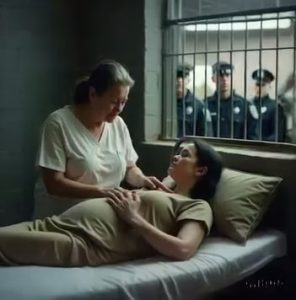Dr. Barbara Gibbs was expecting a quiet night at the small-town maternity ward. All her patients had already delivered, and she was just about to sit down with a cup of tea—when a nurse rushed in, breathless.
“They’ve brought in a prisoner,” she said.
Downstairs, Dr. Gibbs found a young woman groaning in labor, curled on a couch in the ER. Two prison guards stood nearby, watching her like a hawk. After a quick exam, Dr. Gibbs gave orders to prep her for sanitation—but when she tried to take the woman to the maternity ward, the guards moved to follow.
“You can’t come in,” Dr. Gibbs told them calmly but firmly. “We have hospital protocols.”
“She’s a prisoner,” one snapped. “What if she escapes?”
Dr. Gibbs raised an eyebrow. “She’s six centimeters dilated. Trust me—she’s not going anywhere.”
Grudgingly, the guards backed off and cuffed the woman to the hospital bed before taking their post outside.
Inside the delivery room, the harsh tension faded. Dr. Gibbs turned her full attention to the young woman.
“What’s your name?” she asked gently.
“Mia,” the woman said, her voice barely above a whisper.
And just like that, something in Dr. Gibbs softened. In that moment, Mia wasn’t an inmate—she was a mother, scared and in pain, about to bring life into the world.
As labor wore on, Dr. Gibbs coached her with calm confidence, the kind that comes from decades of experience. But something about this particular delivery stirred old memories—ones she hadn’t let herself revisit in years.
Thirty years ago, Barbara had a daughter named Mia, too.
Back then, life looked perfect. Her husband, Taylor, was handsome, successful, and magnetic. But fame changed him. He became cold, manipulative, and unfaithful. The day Barbara caught him kissing another woman in public, she finally confronted him. He didn’t deny it—he just looked her in the eye and shrugged.

Now, watching this Mia grit her teeth through the pain, Barbara felt a wave of something deeper than duty. Whatever mistakes this young woman had made, she still deserved compassion, dignity, and a chance to start over.
Because right here, right now, Mia wasn’t a prisoner. She was a mother. And she was doing one of the bravest things anyone can do—bringing a child into the world.





